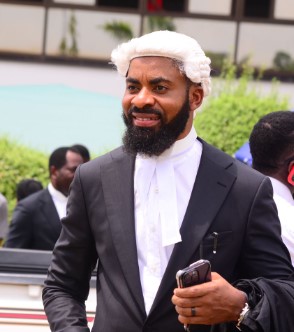The arrest of social media influencer and critic, Verydarkman (VDM), has ignited a storm of controversy in Nigeria, prompting public outcry, protests, and pointed criticism directed at prominent human rights lawyer, Femi Falana (SAN). Deji Adeyanju, a vocal activist and lawyer, has publicly questioned Falana’s silence on the matter, highlighting the perceived inconsistency between Falana’s reputation as a staunch defender of civil liberties and his apparent inaction in VDM’s case. This silence has fueled a broader discussion about the role of prominent legal figures in advocating for freedom of expression, particularly when it involves individuals who express controversial or unpopular viewpoints.
Adeyanju’s critique emphasizes the importance of consistent application of principles related to freedom of speech. He recalls his own actions in defending a critic who had previously instigated attacks against him during the Buhari administration, illustrating his commitment to upholding free speech even for those with whom he vehemently disagrees. This comparison underscores the expectation that human rights advocates should remain steadfast in their defense of fundamental freedoms, regardless of the individual involved or the nature of their expression. The lack of public condemnation from a figure like Falana, known for his vocal defense of human rights, is therefore viewed as a significant departure from established expectations and principles.
VDM’s arrest has become a rallying point for online communities, particularly those concerned about the potential suppression of dissent. The incident has drawn parallels to previous instances of perceived government overreach in silencing critical voices, raising concerns about the trajectory of free speech in Nigeria. The online protests and street demonstrations in Abuja underscore the growing public anxiety surrounding the perceived shrinking space for free expression and the potential use of state power to stifle criticism.
The situation surrounding VDM’s arrest has become symbolic of a broader debate about the boundaries of free speech in the digital age. The ease and speed with which information disseminates online, coupled with the potential for both constructive and destructive use of social media platforms, presents a complex challenge for governments seeking to balance the protection of individual liberties with the maintenance of public order. VDM’s case brings this challenge into sharp focus, highlighting the need for clear legal frameworks and consistent application of principles related to online expression.
The controversy surrounding VDM’s detention underscores the critical role of influential figures like Femi Falana in safeguarding democratic values. Falana’s sustained silence has amplified public concern, suggesting a potential chilling effect on free speech if those perceived as champions of human rights fail to speak out against perceived injustices. The public expectation is that legal luminaries like Falana will consistently uphold principles of due process and freedom of expression, regardless of the popularity or unpopularity of the individuals involved.
The continued detention of VDM, coupled with the public outcry and protests, underscores the urgent need for a transparent and accountable legal process. The absence of clear communication from authorities regarding the specific charges against VDM has fueled speculation and heightened concerns about the potential for arbitrary detention. This situation highlights the importance of a robust and independent judiciary in safeguarding fundamental rights and ensuring that individuals are not unjustly silenced or persecuted for expressing their views, even if those views are controversial or critical of the government. The case of VDM serves as a stark reminder of the fragility of free speech and the constant vigilance required to protect this essential pillar of a democratic society.














